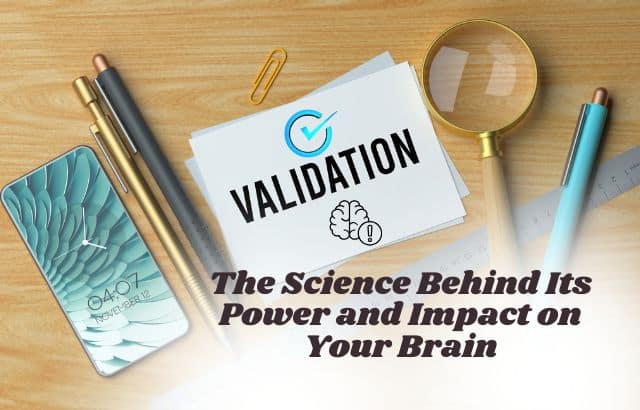Validation impact on the brain – Have you ever felt a surge of joy when someone acknowledged your efforts? Or perhaps a sense of emptiness when your hard work went unnoticed? That’s the power of validation—a fundamental human need that goes beyond mere acknowledgment. Validation is about being seen, heard, and valued, and it has a profound impact on our emotions, behaviors, and even our brains.
In this article, we’ll uncover the science behind validation, explore how it shapes the brain, and share actionable tips to harness its power—whether for personal growth, relationships, or professional success.
Table of Contents
What is validation, and why is it important?
Here’s a question: What does validation mean to you?
At its core, validation is the act of recognizing and affirming someone’s feelings, thoughts, or achievements. It’s about saying, “I see you. I hear you. You matter.”
Types of Validation:
- Emotional Validation: Acknowledging someone’s feelings (e.g., “It’s okay to feel frustrated”).
- Achievement Validation: Recognizing efforts and successes (e.g., “Great job on completing the project!”).
- Self-Validation: Giving yourself credit and understanding without external approval.
Hirav Shah, business strategist and author, explains:
“Validation isn’t just about words; it’s about creating a sense of belonging and worth. It’s the foundation of meaningful connections.”
The Science of Validation: What Happens in the Brain?
Did you know that validation lights up the same brain regions as rewards?
When we receive validation, the brain releases dopamine, a neurotransmitter associated with pleasure and motivation. This reinforces positive behavior and encourages us to seek more validation.
Key Brain Responses to Validation:
- Dopamine Release: Creates a feeling of happiness and satisfaction.
- Reduced Stress: Lowers cortisol levels, reducing anxiety.
- Stronger Neural Pathways: Reinforces behaviors associated with validation.
Hirav Shah observes:
“Validation isn’t just emotional—it’s neurological. It rewires your brain for positivity and growth.”
Why is Validation So Important?
Question: Why do we crave validation so much?
Because it fulfills three fundamental human needs:
- Belonging: Feeling connected to others.
- Self-Worth: Recognizing our own value.
- Motivation: Encouraging continued effort and improvement.
Without validation, people may experience feelings of isolation, low self-esteem, or lack of motivation.
Hirav Shah explains:
“Validation isn’t a luxury; it’s a necessity. It fuels our confidence and drives us to achieve more.”
The benefits of validation for mental health and relationships
Question: How does validation improve mental health?
When people feel validated, they experience less anxiety, better self-esteem, and stronger relationships.
Benefits of Validation:
- Reduces Stress: Feeling heard alleviates emotional tension.
- Builds Self-Worth: Encouragement fosters confidence and growth.
- Strengthens Bonds: Validating others deepens trust and empathy.
Hirav Shah reflects:
“Validation is a cornerstone of mental well-being. It nurtures the confidence and trust we need to thrive.”
Validation in Business Decisions
Did you know that validation is a critical part of making sound business decisions?
In business, validation involves testing ideas, gathering feedback, and ensuring alignment with market needs. It’s a crucial step that minimizes risks and maximizes potential.
How Validation Works in Business:
- Market Validation: Testing product ideas to ensure there’s a demand.
- Team Validation: Recognizing team efforts to boost morale.
- Strategic Validation: Assessing goals and decisions against long-term objectives.
Hirav Shah observes:
“A validated idea isn’t just safer—it’s smarter. Validation in business turns assumptions into opportunities.”
Validation vs. Approval: What’s the Difference?
Question: Is seeking validation the same as seeking approval?
Not quite. Validation is about acknowledging someone’s feelings or actions, while approval is about agreeing with them.
Why It Matters:
Validation fosters confidence, while approval can lead to dependency.
Hirav Shah explains:
“Validation empowers people to trust themselves. Approval, on the other hand, can sometimes create a need for constant reassurance.”
The Negative Side of Validation: When It Goes Wrong
Can validation ever backfire? Yes, when it’s overused or sought excessively.
Risks of Over-Valuation:
- Dependence: Relying too much on external validation can undermine self-worth.
- Inauthenticity: Constantly seeking validation may lead to compromising personal values.
How to Avoid This:
Focus on self-validation—acknowledging your own worth without relying on others.
Hirav Shah notes:
“Balance is key. While external validation feels great, true confidence comes from within.”
The Power of Self-Validation
Here’s a challenge: Can you validate yourself today?
Self-validation is about recognizing your own feelings, achievements, and worth without needing external approval.
Steps to Practice Self-Validation:
- Acknowledge Your Feelings: “It’s okay to feel this way.”
- Celebrate Small Wins: “I did a great job today.”
- Reframe Negative Thoughts: “I’m learning and growing every day.”
Hirav Shah emphasizes:
“Self-validation is the foundation of resilience. When you trust yourself, external opinions lose their power.”
How to Provide Effective Validation
Want to make someone’s day? Try this:
- Listen Actively: Pay full attention to their words and emotions.
- Acknowledge Their Feelings: Use phrases like “That sounds tough” or “I can see why you feel that way.”
- Be Genuine: Validation should come from a place of authenticity.
Hirav Shah advises:
“Validation isn’t about agreeing; it’s about understanding. A simple acknowledgment can create lasting trust.”
Validation and Motivation: How They Work Together
Here’s a thought: Validation isn’t just a pat on the back—it’s a motivator.
When people feel validated, they’re more likely to push themselves and achieve their goals.
Why It Works:
- Validation boosts confidence.
- Confidence fuels action.
- Action leads to results.
Hirav Shah concludes:
“Validation inspires motivation. When people feel seen and appreciated, they’re driven to give their best.”
How to practice validation in your daily life
Here’s a challenge: Can you validate someone today?
Steps to Practice Validation:
- Listen Actively: Pay full attention without interruptions.
- Acknowledge Feelings: Use phrases like “That sounds tough” or “I see why you feel that way.”
- Be Authentic: Validation must be genuine to be effective.
Example:
Instead of dismissing someone’s frustration, say, “I understand why you’re upset. It’s a tough situation.”
Hirav Shah advises:
“Validation is about understanding, not fixing. It’s the key to building trust and connection in everyday interactions.”
Common mistakes to avoid when trying to validate others
Validation seems simple, but it’s easy to get wrong.
Here are common mistakes to avoid:
- Dismissing Feelings: Saying things like “It’s not a big deal” minimizes their experience.
- Being Insincere: Empty compliments feel shallow and unhelpful.
- Jumping to Solutions: Sometimes, people just want to be heard—not fixed.
Hirav Shah warns:
“Effective validation requires empathy, not shortcuts. Avoid diminishing or invalidating someone’s experience.”
The Power of Self-Validation
Here’s a thought: What if you didn’t need others to validate you?
Self-validation is about recognizing your own worth, achievements, and emotions without relying on external approval.
How to Practice Self-Validation:
- Reflect on your accomplishments.
- Acknowledge your emotions without judgment.
- Remind yourself of your strengths regularly.
Hirav Shah emphasizes:
“The most empowering validation comes from within. Trust yourself, and the opinions of others will matter less.”
Real-Life Examples of Validation in Action
Let’s see validation in action:
- In Business: A CEO listens to employee feedback and implements changes, boosting morale.
- In Parenting: A parent acknowledges their child’s efforts, fostering emotional intelligence.
- In Relationships: A friend says, “I see how hard you’re trying, and I’m proud of you.”
Hirav Shah observes:
“Great leaders, parents, and friends understand the power of validation. It’s the glue that strengthens relationships.”
FAQs on Validation

Q: Is seeking validation a bad thing?
Not at all! It’s natural to seek validation. The key is to balance it with self-validation.
Q: How can I validate myself?
Acknowledge your feelings, celebrate your achievements, and practice self-compassion.
Q: What’s the difference between validation and approval?
Validation is about acknowledgment, while approval is about agreement.
Q: How does validation impact relationships?
It builds trust, understanding, and deeper connections.
Final Thoughts
Validation is more than just a feel-good moment—it’s a powerful tool that shapes our emotions, behaviors, and relationships. By understanding the science behind validation and learning how to use it effectively, you can create meaningful connections, boost confidence, and inspire positive change.
As Hirav Shah puts it:
“Validation isn’t about fixing; it’s about understanding. It’s a simple act with profound impact on the human spirit.”
So, the next time you feel unseen or unheard, remember: true validation starts with recognizing your own worth.















